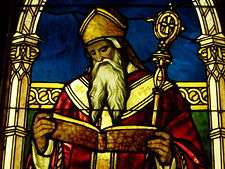Enchiridion of Augustine
| Part of a series on |
| Augustine of Hippo |
|---|
 |
| Main topics |
| Works |
| Influences and followers |
| Related topics |
|
|
The Enchiridion, Manual, or Handbook of Augustine of Hippo is alternatively titled, "Faith, Hope, and Love". The Enchiridion is a compact treatise on Christian piety, written in response to a request by an otherwise unknown person, named Laurentius, shortly after the death of Saint Jerome in 420. It is intended as a model for Christian instruction or catechesis.[1]
As the title indicates, the work is organized according to the three graces necessary for the Christian worship of God: Faith, Hope and Love. Under Faith, Augustine explains the use of the Apostles' Creed, in teaching Christian doctrine and in refuting heresies. Under Hope, he briefly explains the Lord's Prayer as a model of Christian prayer. The final part is a discourse on Christian love.
References
- ↑ The Augustine Catechism: The Enchiridion on Faith, Hope and Charity by Saint Augustine, Boniface Ramsey, 2008, ISBN 1-56548-298-0, p. 9
External links
-
 Works related to The Enchiridion at Wikisource
Works related to The Enchiridion at Wikisource - Full text of the Enchiridion at Christian Classics Ethereal Library
- Albert C. Outler translation of the Enchiridion
-
 The Enchiridion of Augustine public domain audiobook at LibriVox
The Enchiridion of Augustine public domain audiobook at LibriVox